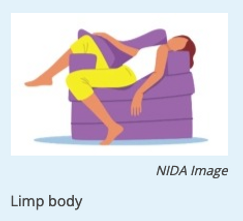

Substance Use and Vaping
First, know your Rights: The Good Samaritan Law
Being in a situation where you, a friend, or a loved one has had too much of a particular substance can be scary. The first thing to know is that you are not alone. Calling 911 is the best approach to helping save a life. If you do not feel comfortable calling 911, consider calling a trusted adult in your life. This can be your parents, a school counselor, your doctor, clergy member, aunt, uncle, therapist, etc. The main take away is that a call for help can be the difference between life and death.
A Good Samaritan Law does exist in Massachusetts which may protect you in situations just like this.
More to come on knowing your rights soon!

How Much Is Too Much?
Substance use disorder is a group of physiological, behavioral, and cognitive symptoms that occur when a person continues to use substances despite facing related problems, distress, or impairment.
This can include issues such as impaired control over usage and engaging in risky behaviors.
Addiction refers to a state of psychological and/or physical dependence on drugs or other substances, such as alcohol. It can also apply to specific activities or behaviors, including sex, exercise, and gambling.
Warning Signs
Mood Changes
Temper flare-ups, irritability, defensiveness
Academic Problems
Temper flare-ups, irritability, defensiveness
Mental, Physical, or Emotional Changes
Temper flare-ups, irritability, defensiveness
Changing Friends
Temper flare-ups, irritability, defensiveness
Finding Drugs or Alcohol
Temper flare-ups, irritability, defensiveness
"Nothing Matters" Attitude
Temper flare-ups, irritability, defensiveness
Peer Pressure
10 Refusal Skills: Get Out of an Uncomfortable Situation
#1 Just say no.
#2 Suggest an alternative activity.
#3 Leave the situation.
#4 Reverse the pressure.
Reversing the pressure gives you more control over the situation.
#5 Use humor.
#6 Ignore the offer.
#7 Give an excuse.
#8 Pass the blame.
#9 Pull in help.
#10 Change the subject.
Yes, obvious. And often easier said than done, but effective! Make eye contact and use a clear voice to sound confident even if you're uncomfortable.
"No thanks. Actually, let's get some food. I'm starving."
Tip: Create a safety codeword to send to a parent or trusted adult. When you send the codeword, the person will come to pick you up, no questions asked.
"If you love me, you'll do this."
Response: "If you love me, you won't pressure me to."
"Just try it once. If you hate it, I won't ask again."
Response: "No. Why would I do something I'm going to hate?"
A joke or a lighthearted comment lifts the tension.
No response sends a message that you're not interested. Don't reply to a text. Don't acknowledge the offer. Continue talking or hanging out as if it never happened.·
"You know I'm a terrible liar. If my parents ask, we will get caught."
"Are you trying to get rid of me? My parents would never let us hang out again."
When you pass the blame, you don't have to defend yourself or your choice.
"Hey guys, help me out. I told him 'no,' but he won't leave me alone." Bringing in other people reverses the peer pressure.
Changing the topic sends a message that your mind is made up.

Smoking and Vaping

Understand How It Works
Our brains come with a built-in reward system.
When you do anything enjoyable— like laughing—your brain releases a natural chemical called dopamine. In essence, dopamine says to your brain, “Hey, I like this activity. It’s worth remembering and repeating.”
Nicotine takes advantage of that same reward system.
When someone inhales nicotine, the drug enters the brain and triggers a surge of dopamine, but much more is released than with usual activities (like eating our favorite food)
The result: The brain receives a strong signal that it really wants to vape some more.
Over time, this can lead to addiction. Once someone has a nicotine addiction, quitting can be very difficult.
Know the Risks
Does Vaping Cause Anxiety? Short Answer: Yes
While nicotine initially induces feelings of pleasure and alertness, prolonged use can lead to dependency and withdrawal symptoms, including increased anxiety.
-
A study of more than 2,500 people ages 13-24 found that those who vape report anxiety symptoms, depressive symptoms and suicidal thoughts when compared with their peers who did not use electronic cigarettes or vape THC.
-
Approximately 60% of the nicotine-only, THC-only and dual vapers self-reported that they experienced anxiety symptoms, versus about 40% of participants who never vaped.
-
Anxiety symptoms were more frequently reported among THC-only vapers.
-
Over half of the nicotine-only, THC-only and dual vapers self-reported that they experienced symptoms of depression versus 25% of non-vapers.
Trying to Quit?
Check out
SmokefreeTXT
Sign up with the form below or text QUIT to 47848. After you confirm your enrollment, you will receive daily text messages to support you in quitting smoking from the short code 47848.
Resources

Massachusetts Substance Use HELPLINE
Call: 800-327-5050
Text "HOPE" to 800321
Truth Initiative
Text "DITCHJUUL" to 88709
To help others quit:Text "QUIT" to 202-899-7550

Become a Smokefree Teen
Text "QUIT" to 47848
Sign up here

Massachusetts Smokers' Helpline
Free, Confidential
Call: 800-QUIT-NOW








